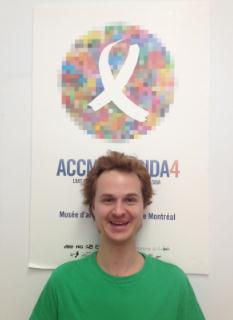“Am I going to die?”
More than 30 years after HIV was first diagnosed and nearly two decades after new meds began extending the lives of AIDS patients, that is still the very first question most newly diagnosed sero-positive people ask when they step into AIDS Community Care Montreal’s drop-in centre looking for help.
“A lot of people still think of HIV as a death sentence,” says Mark Hapanowicz, executive director of ACCM, the English-language HIV/AIDS support organization that will celebrate its 25th anniversary at a Feb 3 benefit cabaret.
“After 25 years our biggest obstacle is remaining relevant for those living with HIV in a world where HIV is changing,” Hapanowicz says, noting that ACCM’s drop-in centre continues to provide a safe social space, while their buyers’ club helps alleviate some of the financial burden caused by the virus through a subsidized bulk-grocery program.
The social and political landscape was much different when ACCM was founded a quarter-century ago. Even just five years ago, to mark its 20th anniversary, ACCM coined the slogan “Help drive us out of business.”
That slogan is something David Cassidy – Montreal’s self-described “grand old man of AIDS,” who helped found ACCM in 1987 – would like to see come true, though that is more likely to happen because of chronic underfunding, not to mention the historic neglect of Montreal’s anglophone AIDS communities.
“In hospitals and [local community service centres] you couldn’t get services [in English in the early days of the pandemic],” Cassidy told this reporter when ACCM turned 20. “So ACCM set up to do everything – for women, in prisons, et cetera. Even Comité Sida Aide Montréal wasn’t doing that . . . I have a history of setting up bilingual coalitions in [gay] Montreal and everything always was, ‘There’s too much English.’ Anglophones provided leadership but were always pushed aside or pushed out, and [the] AIDS [movement here] did the same thing.”
When Cassidy was the AIDS point person at Montreal’s Ville-Marie Social Services in the early 1980s, many healthcare providers didn’t believe a gay-run AIDS group could meet the needs of HIV-positive heterosexuals.
So Comité Sida Aide Montréal (CSAM) was born, in 1983. CSAM was also mandated to provide bilingual services.
But when English-language services quickly deteriorated and a homophobic panic gripped the nation, Cassidy and others created ACCM. “We created our own English support system because nobody else was giving us support.”
Today, ACCM offers services for about 450 clients per year, including 75 regulars. Hapanowicz says 71 percent of those clients are gay men, and the organization is expanding its services in French and Spanish, in addition to English.
While government funding makes up 60 percent of ACCM’s 2012/2013 annual budget of $800,000, now fully 30 percent comes from ACCM-led benefit fundraisers.
“Each year we organize ARTSIDA – our annual art auction raised $60,000 in 2012 – and our upcoming 25th anniversary cabaret will help us raise more funds that will enable us to do stuff that governments won’t touch,” Hapanowicz says, noting ACCM will soon launch its new SextEd education outreach program in Montreal high schools. “Students will now be able to text in their sexual-health questions.”
While keeping with the times, ACCM commemorates its 25 years of community service with Cabaret 87, which will feature performances by many prominent queer Montreal entertainers, such as drag artist Antonio Bavaro and standup comic DeAnne Smith, plus door prizes, a live auction, archival photography and videography.
“This will be a joyous occasion,” Hapanowicz says. “It’ll be a throwback to our old parties where we all showed up in drag, and it will be a great opportunity to reconnect with some older faces.”


 Why you can trust Xtra
Why you can trust Xtra


